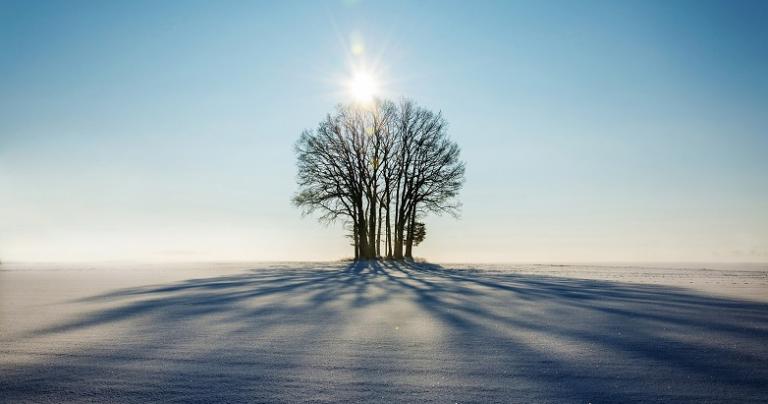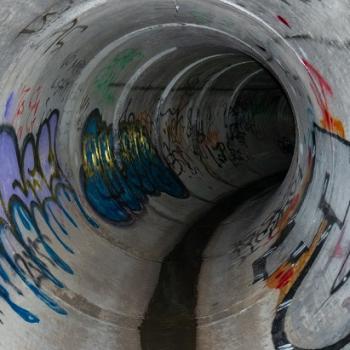Hello, beautiful creatures. It’s been a rough morning, and all I really want is whiskey and a cigarette. Sadly, it’s too early for whiskey and I haven’t smoked in over ten years, so instead I’m drinking heavily-sugared black tea, eating a bagel (plain, with cream cheese), and musing about the dark of the year. Yes, I mean the Winter Solstice, Yule, whatever you wanna call it… but I mean something more than that.
What precisely that something is is harder to define. Which makes it a perfect topic for a blog post, right?
So, I’ll start with a confession: I’ve never been a fan of Christmas. The holiday’s omnipresence in American culture and the consequent obligatory participation in its rites and traditions have conspired to leave me feeling utterly alienated from my peers and the culture of my birth between mid-November and the end of January1.
I realize it’s easy to read this as a hipster renunciation of materialism, secularism, Hallmark holidays, that kind of thing, but my antipathy is more a product of having growing up poor in the 1970s. My memories of Christmas are suffused, not with the rosy glow of holiday cheer and familial love, but with memories of desperation, financial anxiety, and a crushing sense of obligation to feel cheer, to celebrate, to be happy. Visions of sugar-plums and dreams of white Christmases didn’t really enter into the equation, is what I’m saying.
That’s not to criticize my family, please understand. We were just poor, like so very many folks in This Great Land of Ours, and we were following the middle-class script for How You Do Christmas. It didn’t permanently traumatize me or anything. It just left me without any particular enthusiasm for the holiday. When I became an adult and started practicing as an eclectic (and admittedly lackadasical) Pagan, I made a conscious decision to leave behind cultural Christianity and embrace a new paradigm of spiritual observance of the passage of time. This was, of course, the Wheel of the Year. My ambivalence about the Wheel is alredy familiar to some readers, and I will freely admit that at least 25% of that ambivalence derives from the extent to which Yule, the Winter Solstice, is basically celebrated as Pagan Christmas.
I’ll give you a moment to get your “Misha is a grinch!” reactions out of the way. (Hi, Jason!)
I don’t sneer at people who observe Christmas, as part of an ongoing praxis of not sneering at any intrinsically harmless activity which makes people happy, and I’m not here to sneer at Yule-as-Pagan-Christmas. The meanings people invest in the secular version of Christmas—cheer, hospitality, being kind, sharing warmth—really are lovely. For that matter, so are many of the meanings that some religious folks invest in Christmas: hospitality, hope, promise, renewal, grace, salvation for all. If it brings folks joy to import that into their observance of Yule, then by all means, go for it.
It just doesn’t work for me as a holiday, any more than regular ol’ Christmas did.
What does work for me, though, is an observance of the turn of the seasons. The push and pull of sun and shadow. The slow dimming of the light as we slide towards the deepest dark of the year. Food, drink, fellowship, warmth, and love, shared at the inflection point of darkness and light. Keeping vigil through the longest night of the year, awaiting the return of hope, the promise of the Spring to come.
Yeah, that all works for me.
It seems churlish to suggest that I would find Yule less objectionable if it were celebrated less like Christmas, and I realize I’m perilously close to doing so. Of course, a careful reader will note that none of the things I like are exclusive to some purist ideal of Yule. In fact, most of them are actually part and parcel of the ways most people celebrate a Winter HolidayTM. I actually reused several words from my description of secular and religious Christmas to describe what I like about observing the Solstice.
So, what am I complaining about? What’s my problem with Yule?
I suppose it’s the obligation that, rightly or wrongly, seems to permeate the whole endeavor. It’s the cultural and social pressure to exhibit Yule CheerTM, regardless of how one might actually be feeling. It’s the expectation of giving and receiving presents, no matter how strapped one’s finances, time, energy, or resources might be. It’s the sense that, on some level, the ways we celebrate Yule just duplicate and reiterate all the things about Christmas that made my childhood Christmases so sad.
Am I telling you not to celebrate Yule as Pagan Christmas? Goodness, no. As I said before, do what brings you joy. I’ll be happy to wish you a joyous Solstice, a blessed Yule, even a merry Christmas. I’ll join you in a glass of eggnog, which I find utterly delicious with or without added spirits. I’ll be happy to look at pretty lights and to share warmth, and food, and fellowship.
Just please, don’t ask me what I want for Yule. Or to carol. I hate caroling.
Until next time, dear ones, stay warm and safe. ♥
[If you’re interested in my other semi-heretical opinions about the Wheel of the Year, you can read my thoughts on Mabon, my Samhain musings about the dead and the ancestors, and my decisively divisive feelings about Beltane.]

- Okay, yes, fine, more alienated.

















